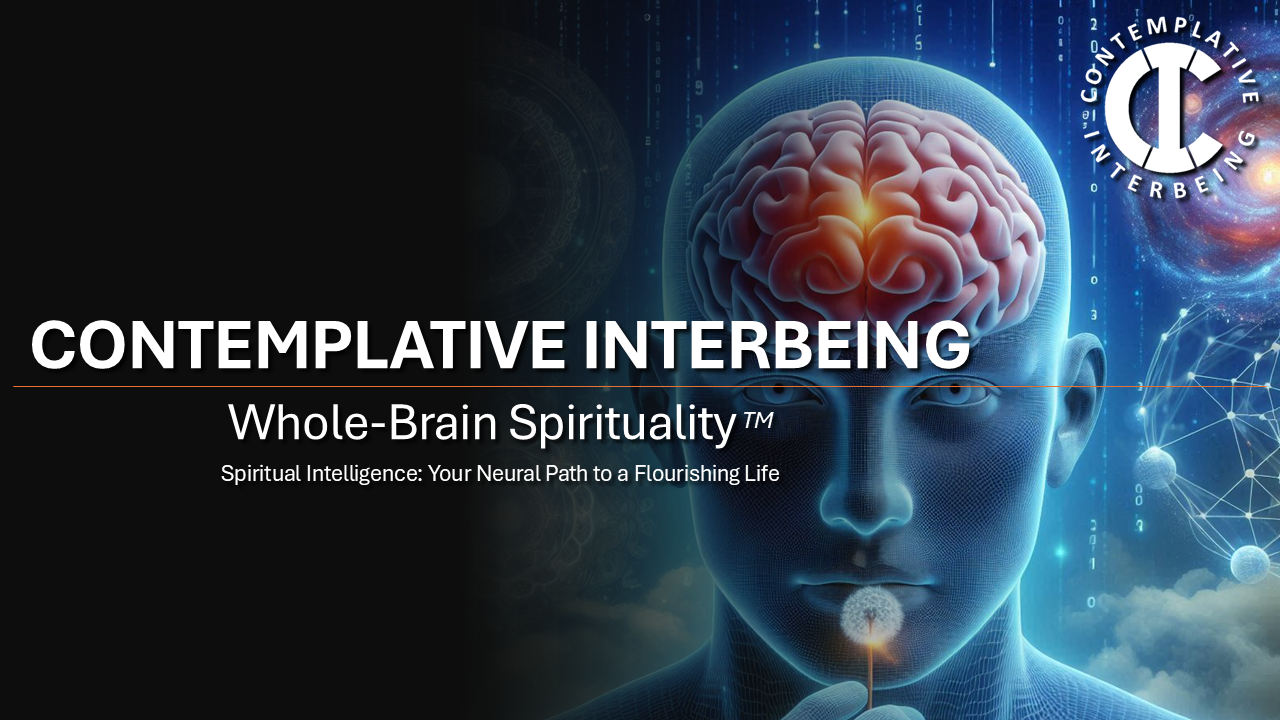Welcome to Contemplative Interbeing, where we explore the transformative power of Whole-Brain Spirituality™ and Spiritual Intelligence. Our mission is to guide you on a neural path to a flourishing life, integrating cutting-edge neuroscience with ancient wisdom traditions. We believe that Spiritual Intelligence (SQ) is not just a concept, but a practical tool for personal growth and societal transformation.
At the heart of our approach is the understanding that Spiritual Intelligence engages the whole brain, transcending the limitations of traditional intelligence models. By cultivating SQ, we tap into our innate capacity for meaning-making, ethical behavior, and holistic thinking. Our work delves into how this intelligence can be developed and applied in daily life, fostering resilience, compassion, and a deeper connection to ourselves, others, and the world around us. Join us on this journey of discovery as we unlock the potential of your Spiritual Intelligence and pave the way for a more fulfilling and purposeful existence.
Spiritual Intelligence (SQ) represents a frontier in our understanding of human cognition and consciousness. It extends beyond traditional measures of intelligence to encompass our capacity for meaning, purpose, and transcendence. As we navigate an increasingly complex world, SQ offers a framework for integrating our intellectual, emotional, and spiritual faculties, enabling us to lead more fulfilling and purposeful lives.
Whole-Brain Spirituality™, Spiritual Intelligence, and contemplative practices are synonymous, complementary, and supportive of each other in enhancing our capacity for personal growth and spiritual development. Whole-Brain Spirituality™ recognizes that our spiritual experiences and insights involve the integration of multiple neural networks, fostering a holistic approach to spirituality that engages IQ, EQ, PQ, and SQ. This aligns seamlessly with Spiritual Intelligence (SQ), which represents our ability to access higher meanings, values, and purposes, transcending the limitations of traditional intelligence models. Contemplative practices, rooted in ancient wisdom traditions, serve as practical tools to cultivate this intelligence, activating whole-brain engagement and deepening our spiritual awareness. Through practices like centering prayer, mindfulness, and lectio divina, we can intentionally shift our attention to the subject-pole of consciousness, as described in SQ theory, allowing us to experience the qualities of wisdom, compassion, and inner peace that characterize spiritual intelligence. This integrative approach not only enhances our personal well-being but also fosters a more profound connection to ourselves, others, and the divine, ultimately leading to a more flourishing and purposeful life.
What is Spiritual Intelligence?
Spiritual Intelligence refers to the ability to access deeper levels of meaning and purpose, to align with core values, and to navigate existential questions. It complements other forms of intelligence, such as:
- IQ (Intelligence Quotient): Cognitive abilities and logical reasoning
- EQ (Emotional Quotient): Emotional awareness and regulation
- PQ (Physical Quotient): Bodily-kinesthetic intelligence
SQ encompasses skills such as self-awareness, holistic thinking, compassion, and the capacity for transcendence. It’s not tied to any specific religious belief but rather represents a universal human potential for deeper understanding and connection.
 MENU
MENU
Key Models and Theories
Several prominent thinkers have contributed to our understanding of Spiritual Intelligence:
- Danah Zohar’s 12 Principles of SQ: Zohar identified key qualities that characterize spiritually intelligent individuals, including self-awareness, spontaneity, and the ability to reframe situations.
- David King’s Four Types of Spiritual Intelligence: King proposed core abilities comprising SQ, including critical existential thinking and personal meaning production.
- Sisk and Torrance’s Mosaic Approach: Dorothy Sisk and E. Paul Torrance developed a multidisciplinary understanding of spiritual intelligence, defining it as the ability to use a multisensory approach to problem-solving while maintaining a connection to the self, others, and the universe.
- Robert Emmons’ Five Components of Spiritual Intelligence: Emmons proposed that spiritual intelligence consists of the capacity for transcendence, the ability to enter heightened spiritual states, the ability to invest everyday activities with a sense of the sacred, the ability to utilize spiritual resources to solve problems, and the capacity to engage in virtuous behavior.
- Cindy Wigglesworth’s SQ21 Model: Wigglesworth developed a model of spiritual intelligence that includes 21 skills across four quadrants: higher self/ego self awareness, universal awareness, higher self/ego self mastery, and spiritual presence/social mastery.
These models represent different approaches to understanding and conceptualizing spiritual intelligence, from Zohar’s focus on personal qualities to King’s emphasis on cognitive abilities, and from Sisk and Torrance’s interdisciplinary perspective to Emmons’ and Wigglesworth’s more structured frameworks. Each contributes valuable insights to our understanding of this complex aspect of human intelligence.
The Neuroscience of Spiritual Intelligence
Emerging research in neuroscience is shedding light on the biological underpinnings of spiritual experiences and intelligence:
- The Binding Problem: This concept explores how the brain integrates disparate inputs into unified conscious experiences, potentially relating to spiritual awareness.
- Rodolfo Llinás and 40 Hz Oscillations: These brain wave patterns may play a role in consciousness and potentially in spiritual states.
Developing Spiritual Intelligence
Cultivating SQ involves practices such as:
- Mindfulness and meditation
- Reflective inquiry and journaling
- Engaging with nature and art
- Exploring philosophical and existential questions
By developing our spiritual intelligence, we can enhance our decision-making, improve relationships, and find greater meaning and purpose in our lives.
Conclusion
Spiritual Intelligence offers a holistic approach to understanding human potential and consciousness. As we continue to explore this dimension of intelligence, we open new pathways for personal growth, social harmony, and addressing complex global challenges. Whether through scientific inquiry, philosophical exploration, or personal practice, the study of SQ promises to deepen our understanding of what it means to be fully human.This introduction serves as a gateway to more detailed explorations of SQ concepts, models, and practices. We invite you to delve deeper into the various aspects of Spiritual Intelligence and discover how it can enrich your life and perspective.

